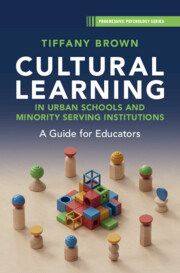Book contents
- Cultural Learning in Urban Schools and Minority Serving Institutions
- The Progressive Psychology Book Series
- Cultural Learning in Urban Schools and Minority Serving Institutions
- Copyright page
- Contents
- Figures and Tables
- Introduction
- Chapter 1 An Action Science Approach to Cultural Learning in Urban Schools and Minority Serving Institutions (MSIs)
- Chapter 2 Directly Observable Data on K-12 Teachers in Urban Schools
- Chapter 3 Culturally Accepted Meanings and Understandings Shared by K-12 Urban Teachers
- Chapter 4 Individual Action Strategies K-12 Urban Teachers Use at Work
- Chapter 5 Collective Action Strategies K-12 Urban Teachers Use at Work
- Chapter 6 Single-Loop Learning and Double-Loop Learning Conditions in Urban Schools
- Chapter 7 Implications from the Systematic Review for Four Types of Cultural Learning K-12 Urban Teachers Engage in at Work
- Chapter 8 Empirical Research on College Faculty Thinking and Action in a Minority Serving Institution
- Chapter 9 Faculty Value Orientations for Single-Loop Learning and Double-Loop Learning at Work with Students from LIMCCs
- Chapter 10 Consequences of Model I and Model II Values for Learning across Student–Teacher Cultural Differences in MSIs
- Chapter 11 Faculty Variance in Use of Traditional and Culturally Responsive Classroom Management Strategies
- Chapter 12 Consequences of Variance in Use of Traditional and Culturally Responsive Classroom Management Strategies for Learning across Student–Teacher Differences in MSIs
- Chapter 13 Implications from the Empirical Data for Instructor Learning across Cultures in MSIs
- Conclusion
- Appendices
- References
- Subject Index
Chapter 13 - Implications from the Empirical Data for Instructor Learning across Cultures in MSIs
Published online by Cambridge University Press: 20 March 2025
- Cultural Learning in Urban Schools and Minority Serving Institutions
- The Progressive Psychology Book Series
- Cultural Learning in Urban Schools and Minority Serving Institutions
- Copyright page
- Contents
- Figures and Tables
- Introduction
- Chapter 1 An Action Science Approach to Cultural Learning in Urban Schools and Minority Serving Institutions (MSIs)
- Chapter 2 Directly Observable Data on K-12 Teachers in Urban Schools
- Chapter 3 Culturally Accepted Meanings and Understandings Shared by K-12 Urban Teachers
- Chapter 4 Individual Action Strategies K-12 Urban Teachers Use at Work
- Chapter 5 Collective Action Strategies K-12 Urban Teachers Use at Work
- Chapter 6 Single-Loop Learning and Double-Loop Learning Conditions in Urban Schools
- Chapter 7 Implications from the Systematic Review for Four Types of Cultural Learning K-12 Urban Teachers Engage in at Work
- Chapter 8 Empirical Research on College Faculty Thinking and Action in a Minority Serving Institution
- Chapter 9 Faculty Value Orientations for Single-Loop Learning and Double-Loop Learning at Work with Students from LIMCCs
- Chapter 10 Consequences of Model I and Model II Values for Learning across Student–Teacher Cultural Differences in MSIs
- Chapter 11 Faculty Variance in Use of Traditional and Culturally Responsive Classroom Management Strategies
- Chapter 12 Consequences of Variance in Use of Traditional and Culturally Responsive Classroom Management Strategies for Learning across Student–Teacher Differences in MSIs
- Chapter 13 Implications from the Empirical Data for Instructor Learning across Cultures in MSIs
- Conclusion
- Appendices
- References
- Subject Index
Summary
In this chapter I return to a primary goal of the book previously stated in Chapter 1 – developing theories about the data that are consistent, credible, and formatted in such a way that they might be operationalized and tested through quantitative research. Rather than generate my own theories about the data, this chapter theorizes that there are evidence-based connections to be drawn between CUNY instructors’ values (thinking) and their use of classroom management strategies (action). I parse out themes from the previous four chapters onto two figures used to depict Model O-I and Model O-II learning systems. This analysis illustrates how the interview data indicate CUNY instructors experience elements of both Model O-I and Model O-II systems in the behavioral worlds they share on this campus.
Keywords
- Type
- Chapter
- Information
- Cultural Learning in Urban Schools and Minority Serving InstitutionsA Guide for Educators, pp. 187 - 200Publisher: Cambridge University PressPrint publication year: 2025

